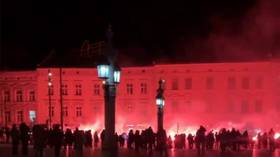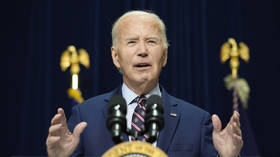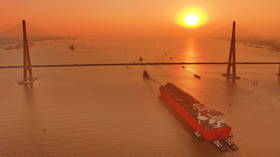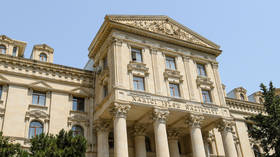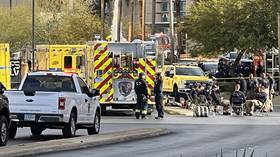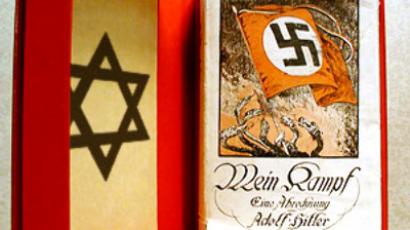“EU will only lose by leaving us behind” – Turkish PM
Turkish Prime Minister Recep Tayyip Erdogan shared with RT his thoughts on the country's prospects for accession to the EU and other issues dominating its foreign policy.
RT: Since you came to power, you and your party have chosen a multilateral foreign policy, and, as a result of this, you are moving towards becoming the leader of the Islamic world. Will you be able to maintain this strategic position?
RTE: I did not try to become a leader of the Islamic world. I did not put any effort into becoming one. Things like this do not happen just because someone wants to occupy this or that post. The thing is, we believed in something. We believed in serving our people in the best way possible. Of course, here in Turkey, we wanted to establish equal relationships with other countries, because there is a problem of inequality in our world. Many countries have been struggling with it. In Turkey, we have a century-long state tradition of how to overcome problems. So, how can Turkey contribute in this respect? First, we need to become stronger and bring relationships with our neighbours to a positive point. And then we will extend this circle of peace. It is like when you drop a stone into water and first it causes small ripples, which then grow larger and larger.
RT: Turkey’s accession to the European Union is a big topic. Recently, Angela Merkel and Nicolas Sarkozy spoke out against EU expansion, at the expense of Turkey. Why do you think they are against it, and also – what are the real prospects of Turkey, a Muslim country becoming part of the EU architecture?
RTE: Some European leaders want to implement rules, which are not in line with the EU’s accession legislation. They have started to implement them only for Turkey. This is not fair. But despite all this, we do not lose hope. Despite such a policy we will keep striving to join. When the European Union says: Turkey, we do not accept you – as soon as they say that, everyone will see what the EU serves in this world. What we are saying is regardless of whether you accept Turkey or not, we are already in the EU. There are five million Turks in EU countries already. You will only lose by leaving us behind. Why? Because Turkey is not going to become an additional burden for the EU, it is going to actually lift some of the existing burdens the EU has. There are countries already in the EU which cannot compete with Turkey in terms of freedom and economy. Why do they not accept Turkey? When you take a closer look at this, you see political reasons. They say the population of Turkey is too big as well [in terms of its geography]. Did it really come as a surprise? Did they not know Turkey’s population data beforehand? Was it that different then? It was the same. And therefore, such an approach is not sincere. If the European Union makes a permanent decision not to accept us, then Turkey will make its decision based on that. But since we are holding talks with the new EU chairman, we are about to enter a new stage. During this new period we can take many different steps. We can make progress on many aspects, I believe.
RT: You are going to the United States to meet with the US President. Afghanistan is one of the topics on the agenda. In November, Turkey increased the number of its troops there to over 1,700. Did Turkey pay its debt to NATO in advance, in response to the US request for additional troops? Did Turkey meet the request by sending more troops?
RTE: Frankly speaking, Turkish armed forces have established new horizons there. What do I mean? We said that to have 750 or 800 of our troops there is not enough. We needed to send around 1,000 more to reach the number of 1,750 so that we can continue to serve in that region. At that time, there were no requests to increase the number of troops. The Turkish army made the decision to send our soldiers there on its own accord. During their service there, we have achieved some results and we want to continue to maintain this success. This time, however, we are taking it to a higher level of service by helping to build the infrastructure.
RT: If we talk about Turkey and US relations, Turkey says that America is its strategic partner, but as of today your partnership is mainly military. So, why can’t your partnership be more efficient than just cooperation in Afghanistan and Iran?
RTE: As for our partnership with the US, Obama introduced a new approach during his visit to Turkey, which is indeed very meaningful. He used the term of a “model” partnership, and we have started this process. We are together on the issues of Afghanistan, Iraq and Lebanon. Apart from that, of course, we are also working with the US in the Balkans and in Kosovo and everywhere else where NATO is present. Turkey is alongside the United States, especially in terms of military. As for politics, there are also areas where we cooperate within many different international organizations and commissions. During the G20, for instance, we took some joint steps in the areas of peace, and freedom especially. We share intentions in that respect. Currently though – and I will be very frank with you – if we look at economic cooperation, our primary partner is the Russian Federation, with a $38 billion turnover as of the end of 2008. That is predominantly in the field of energy, where we have very intensive cooperation. Our turnover with the United States is around $12 billion. We definitely need to further our economic cooperation with the US. I am not saying that there is competition between the US and Russia in this respect. What I am saying is that we are open for cooperation, and we want to expand it. Actually, we need each other.
RT: Now, two rival gas pipelines – Nabucco and South Stream – are to go through the territory of Turkey. Which one does Turkey favor more? Not economically, because economically both are to the advantage of Turkey, but in terms of a political partner, strategically.
RTE: We are not partners in the South Stream project. We are partners in Nabucco, though, and are involved in it. I see them as complimentary projects. Europe cannot be satisfied with either Nabucco or South Stream, but both projects can meet the demand of Europe and fill a very big gap. We are involved in the South Stream project at the level of research and exploration. And Nabucco, as you know, involves six countries: Turkey, Romania, Bulgaria, Hungary, Austria and Germany. Companies in these countries have taken up this project. Of course, we are a transit country, but there are supplying and consumer countries as well. Turkey is also a consumer country. So, we need to implement the Nabucco project as fast as we can. I, personally, and the relevant ministers and authorities continue to work on this as we want to launch Nabucco as soon as possible.
RT: Lately you have been very outspoken, and actually defending Iran, saying that the West is being unfair and unjust. What exactly do you mean? What mistakes is the West making in regards to Iran?
RTE: On the one hand, you cannot impose sanctions and then sell things to them through different channels. I do not believe this is possible. On the other hand, if Iran says that it develops a nuclear power station for humanitarian reasons, and someone says no, you are not going to do that, you should do something else instead – well, this would not be honest either. People who object to this have nuclear power stations in their countries. Plus, there are other countries with nuclear power stations in the region. If you look at the situation from a fair and just point of view, how would you then approach this situation? This is how I see it.
RT: As for Armenia, Turkey is now planning to restore diplomatic relations with this country. What exactly will be done about what Armenia refers to as the Armenian genocide?
RTE: I sent a letter in 2005 to the then Armenian President Robert Kocharian and I said that we should let the historians investigate this. There has been no reply. This is the job of historians, not politicians. Besides, the Turkish nation, our grandparents, did not commit genocide. They just would not have done it. There are certain features and conditions to genocide. The Ottoman Empire would not have fallen for such a mistake. We are talking about the year of 1915, which is eight years before the Turkish Republic was proclaimed. So, you can never look at those events as genocide. What happened was the deportation of people from one area to another, which caused certain conflicts. Both sides suffered losses. You can see this clearly in the historical records as we have opened up our archives now. What we say now is that Armenia should give access to its archives and let investigators do their research so that we can reach a solution. Simple as that. But Armenia is not doing this, and since this is the case, they do not have the grounds to accuse Turkey. We will never accept blame for such a thing.
RT: How can you settle it and does it mean that Armenia is willing to forget their claims in order for Turkey to open up its borders?
RTE: As an act of goodwill, we have extended a peaceful hand to them, regardless of whether they accept it or not. Before anything else, however, there is the problem of Nagorno-Karabakh and Azerbaijan, the issue of the frozen conflict must be first dealt with. And then, we will usher in a new era.
RT: Thank you very much for your time sir.





